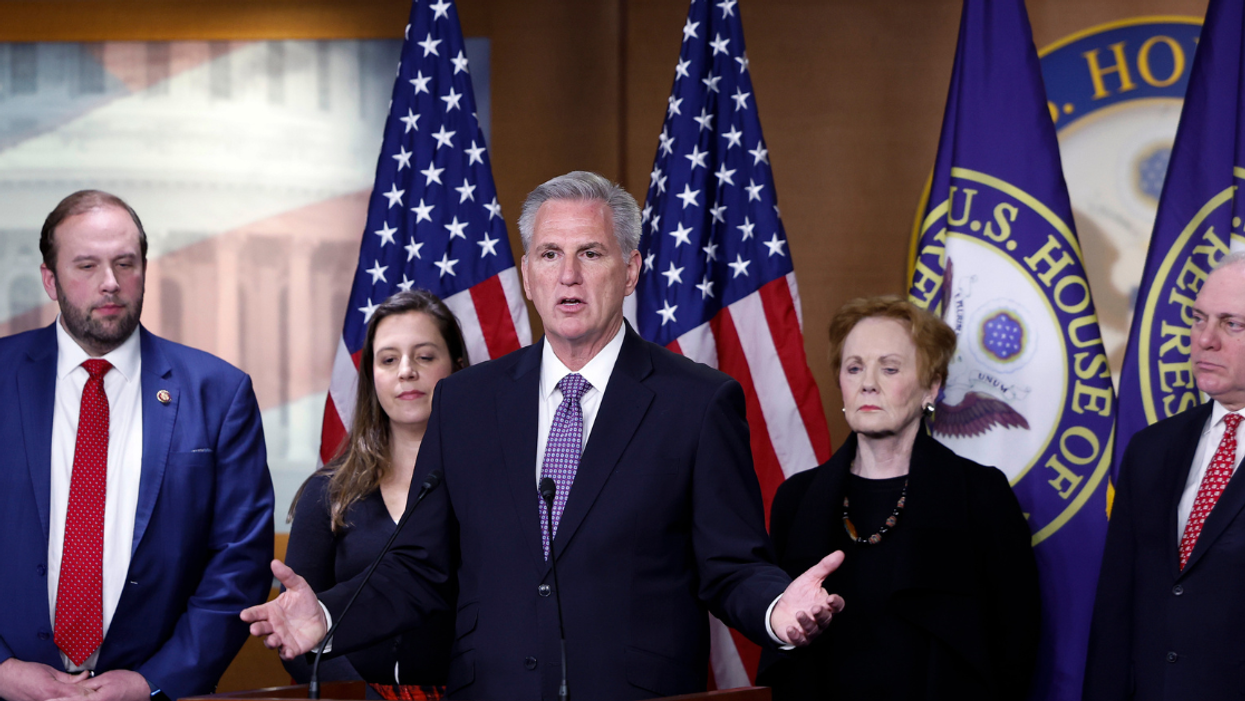UPDATE: After three rounds of voting, Rep. Kevin McCarthy failed to garner the requisite 218 votes to become Speaker, and in fact lost votes on each subsequent round of voting. Democrats, on the other hand, are united behind their leader in Rep. Hakeem Jeffries.
The House has adjourned until 12pm tomorrow to continue the voting. No new representatives are able to be sworn in until a new Speaker is elected.
------------
It’s just hours before the new 118th Congress convenes, and despite having a majority of 222 to 212 votes, Republican Representative Kevin McCarthy of California—longtime House Minority Leader—still does not appear to have the votes to ascend to the Speakership.
McCarthy finds himself in a bitter position. After all, there was supposed to be a Red Wave that carried as many as 50 seats his way, giving him great leeway to ignore his detractors in his own party.
Instead, after a disappointing midterm election, he’s perched atop a razor-thin majority and cannot afford to lose more than four votes to get him to the magic 218 number.
In an ironic twist, Speaker Pelosi held the same thin margin in the House before him, with only four votes she could afford to lose, but she was able to secure the votes needed for her Speakership without drama or delay.
Not so, apparently, for McCarthy.
For starters, there is a bloc of five extremist Republican Representatives calling themselves the Never Kevins—Arizona's Andy Biggs, Florida's Matt Gaetz, Virginia's Bob Good, Montana's Matt Rosendale and South Carolina's Ralph Norman—who have said they will not vote for McCarthy under any circumstances.
McCarthy would need to peel one of those votes away or at least get one of them to vote “present” instead of for another candidate. And now, there is a new danger lurking from others in the right wing of his party.
Let’s dive in.
McCarthy grants major concessions, but it ain’t enough for his detractors.
Hard core conservatives have been demanding that McCarthy change the House rules to empower their wing.
This importantly includes reverting to an old rule, called the motion to vacate, through which any single GOP House caucus member can call for a vote to oust the Speaker.
McCarthy has resisted this for weeks, and for good reason. He remembers full well that this was the rule that doomed Republican Speaker John Boehner of Ohio.
In fact, it was Mark Meadows—then head of the House GOP “Freedom Caucus"—who originally made the motion that felled Boehner in 2015. McCarthy then witnessed how that same caucus took down GOP Speaker Paul Ryan of Wisconsin.
McCarthy has worked hard to embrace the far-right wing rather try to marginalize it, but it seems the caucus remains emboldened and ready to bring him down, too, as not conservative enough.
The current motion to vacate rule, adopted in an internal GOP meeting back in November 2022, requires at least half of the GOP caucus to back it.
The far-right wants to restore the old rule requiring only one member’s motion, and McCarthy apparently has landed on what he thinks is a compromise: At least five GOP members must make that motion together.
That is quite the concession, from 111 members down to just five, but it apparently hasn’t been enough for McCarthy’s critics. Nine of them fired off a response to his various concessions saying the new motion to vacate rule did not go far enough.
Tellingly, none of the Never Kevins was even part of this other group of nine conservative detractors, indicating that McCarthy has his work cut out for him to win over no less than nine of the fourteen known current holdouts.
By some reports of the whip count, there are as many as 18 members aligned against McCarthy, with nine of them a hard “no.”
This has put McCarthy in a mood to compromise.
He agreed, as part of his concessions, to create a House Judiciary select subcommittee on the “Weaponization of the Federal Government.” The job of this subcommittee apparently will be to launch investigations into the Biden Administration and intelligence community.
It amounts to an official way to “investigate the investigators” and to create a smokescreen for underlying misdeeds, all while fueling conspiracies that help the GOP raise money from right-wing media consumers.
As for his critics’ demands that there be more conservative representation on committees, McCarthy’s letter was fairly vague:
"I will use my selections on key panels to ensure they more closely reflect the ideological makeup of our conference, and will advocate for the same when it comes to the membership of standing committees."
"This will facilitate greater scrutiny of bills from the start so they stand a greater chance of passing in the end."
In their letter response, the nine conservatives accused McCarthy of offering too little, too late.
The letter read:
“Despite some progress achieved, Mr. McCarthy’s statement comes almost impossibly late to address continued deficiencies ahead of the opening of the 118th Congress on January 3rd.”
That spells possible chaos as McCarthy calls for a vote for his Speakership.
House Freedom Caucus chair GOP Representative Scott Perry of Pennsylvania—who is knee-deep in January 6 investigations due to his close association with co-conspirator Jeffrey Clark—was especially quick to dismiss McCarthy’s offer.
Perry said:
“I think what he’s trying to do is the bare minimum that he needs to try and get to where he can get the votes."
"And that’s not indicative of somebody that really wants to embrace new ideas, reject the status quo and unify all members in the conference.”
Perry has not committed to voting either for or against the GOP leader.
Opponents of McCarthy received a further lift as the powerful conservative Club for Growth backed the concession demands of the Freedom Caucus.
It issued a “key vote alert” saying, “If a candidate for Speaker refuses to support or adopt” the reforms it has outlined, then it will urge “all Representatives to vote against that candidate for speaker.”
Ruh-roh, Kevin.
The leadership fight might devolve into a total circus.
The factions intend to play a game of chicken, and it isn’t clear which side will swerve first.
For the Never Kevins to hold any real power, they will need to keep their group of five disciplined and voting as a unit for another speaker candidate, likely Andy Biggs, or second-in-command Louisiana Representative Steve Scalise, or perhaps even Ohio Representative Jim Jordan as an alternative to McCarthy.
At the same time, McCarthy cannot continue to offer concessions or he would achieve at best a Pyrrhic victory, holding the title only so long as he can continue to appease his staunchest critics on the right.
A contested House speakership, requiring more than one roll count vote, hasn’t occurred in some 100 years. But it now seems likely that McCarthy will fall short of the required 218 votes in the first round of balloting.
So what will he do next?
Reporter Robert Costa has heard from several sources that McCarthy would then attempt the unprecedented: refusing to yield the floor so long as the vote has not gone his way.
Wrote Costa on Monday night:
"What I keep hearing tonight at Cap from sources close to McCarthy: he’s going to stay on the floor tomorrow. That’s the plan."
"Battle it out, if need be, but do it in the open and have the conversations in public. He’s being told to never leave the floor by rank-and-file allies."
"The fear among some of his friends: the Never Kevin types want it to go to backroom conference meeting so they can try for a major leadership shakeup."
"Closed door member to member theater. That’s not what McCarthy’s want so they are pushing him to never leave the floor."
Should this happen, the nation will bear witness to the Republicans in noisy disunity even though they supposedly have assumed control of the House and presumably have begun their first bit of work.
Committee assignments would go unfilled with no one to negotiate the ratio of Democrats to Republicans. No members officially would be seated, not even the con artist George Santos who is already under multiple state and federal investigations.
Without a party leader, there is no GOP agenda that can be pursued—not that the Republicans have much of one beyond investigating Anthony Fauci, Alejandro Mayorkas, Hunter Biden and Merrick Garland, scrapping oversight by the Office of Congressional Ethics and blocking further aid to Ukraine.
The finger-pointing and recriminations have already begun.
Lamented Texas Republican Representative Dan Crenshaw:
“It’s a shame. It makes us look foolish."
"If I didn't know any better, it’s like the Democrats paid these people off... Let’s make it look like the Republicans can’t govern and don’t deserve any gavels whatsoever."
"That’s what it makes it look like.”
By contrast, the Democrats are in lockstep and elected their new House leadership with nary a hiccup.
Will the GOP really shoot itself in the face on its first day in power in the House? Are its members truly in such disarray?
Stay tuned.







 @iamdaydreamin_/Instagram
@iamdaydreamin_/Instagram @loversfriendschi/Instagram
@loversfriendschi/Instagram @peachyyyangieee/Instagram
@peachyyyangieee/Instagram @y2kbug.zip/Instagram
@y2kbug.zip/Instagram Allie/TikTok
Allie/TikTok EclipseHope13 - /
EclipseHope13 - / Karina Skellington/TikTok
Karina Skellington/TikTok Nadia Spitaels/TikTok
Nadia Spitaels/TikTok Kkkkkakes/Instagram
Kkkkkakes/Instagram mister_bones__/TikTok
mister_bones__/TikTok





 @uaschyperpolyglot; @xopherx/Bluesky
@uaschyperpolyglot; @xopherx/Bluesky @augustjpollak/Bluesky
@augustjpollak/Bluesky @augustjpollak/Bluesky
@augustjpollak/Bluesky @augustjpollak/Bluesky
@augustjpollak/Bluesky @owill8s/Bluesky
@owill8s/Bluesky @sethcotlar/Bluesky
@sethcotlar/Bluesky @zoesamuel/Bluesky
@zoesamuel/Bluesky  @clggmf/Bluesky
@clggmf/Bluesky


 Friends Hug GIF by MOODMAN
Friends Hug GIF by MOODMAN  Body Wiggle GIF
Body Wiggle GIF  Aging Jamie Lee Curtis GIF
Aging Jamie Lee Curtis GIF  Serious
Serious